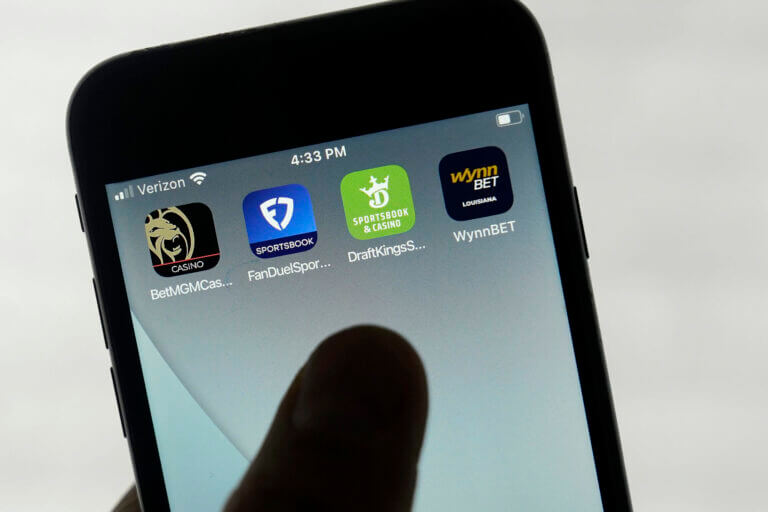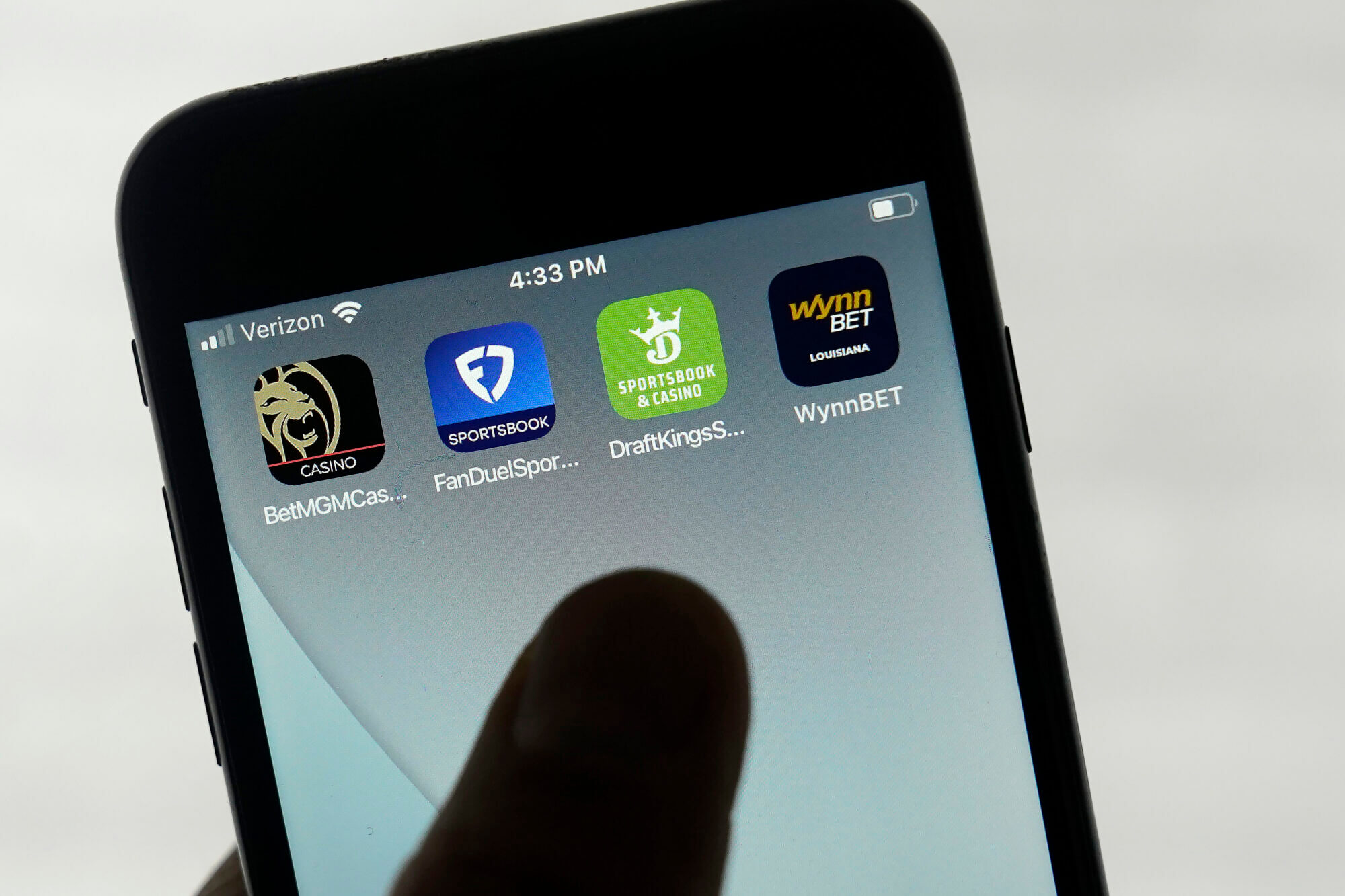

On the heels of the Legislature’s most recent failed attempt to legalize mobile sports betting in Mississippi, a 52-year-old gambling enthusiast named Gary drew a distinction between himself and his fellow bettors: He is a winner, and most of them are losers.
“To say it honestly, most people are losers when it comes to sports betting because they lose control. But I hope they legalize it because I have control over my gambling,” Gary said. “Certain members of my family call me a degenerate, but I guarantee you I’m not a losing sports bettor.”
Gary, whose full name Mississippi Today agreed not to publish so he could speak candidly about placing illegal sports bets, is among the Mississippi residents who have together placed, according to some analysts, billions of dollars in online sports bets through illicit offshore betting platforms. He is also among the dozens of people who told Mississippi Today, in a written survey and interviews, about what legalization would mean for those who currently bet illegally.
What emerged is a portrait of the state’s shadow sports betting economy alongside growing concern among experts about the potential for gambling addiction.
A thriving black market
The push to legalize mobile sports betting in Mississippi has prompted a debate that has captured the attention of powerful moneyed interests and ordinary citizens alike. It has unfolded in bustling casinos on the Coast, church pews in the Delta and the group text chains of sports-obsessed college students.
Favorable regulatory and technological shifts have led to rapid growth for the online gambling market in recent years. But the industry continues to be undercut by illegal operators. Online gross gaming revenue in the U.S. topped $90 billion in 2024, $67 billion of which went to unlicensed players, according to research commissioned by the Campaign for Fairer Gambling, a group that lobbies against illegal gambling.
Mobile sports betting statewide has remained illegal in Mississippi, largely due to fears that legalization could harm the bottom line of the state’s casinos and increase gambling addiction. In 2024, illegal online betting in Mississippi made up about 5% of the national illegal market, which is about $3 billion in illegal bets in Mississippi, proponents said that year.
From the start of the most recent NFL season to about March, Mississippi had recorded 8.69 million failed attempts to access legal mobile sportsbooks in other states, according to materials presented to House members at a legislative meeting.
Those who engage in illegal online sports gambling and spoke to Mississippi Today described a black market that bridges newfangled technologies with the illicit gambling practices of yesteryear. Some use “arbitrage betting tools” and virtual private networks, or VPNs, to bet across the globe on different sites, pitting casinos against each other. Others keep themselves a degree removed from placing bets directly, using “bookies” to place bets on offshore gambling sites.
However people place illegal sports bets, the persistence of a thriving black market and an estimated $40 million to $80 million a year in tax revenue legal sports betting could bring in has prompted a fierce push for lawmakers to legalize the practice. The sports gambling lobby, as it has done in other states, has spent hundreds of thousands of dollars on Mississippi politicians trying to win the Legislature’s support.
The Mississippi House in 2023 and 2024 passed legislation legalizing online betting, but it died in the Senate.
Some form of sports betting is legal in 40 states, though only 20 have full online betting with multiple operators, according to Action Network, a sports betting application and news site. Some states have only in-person betting, and some only have a single online operator. Mississippi permits sports betting, but it only allows bets made in person at casinos or bets made with apps on mobile devices while inside casinos.
That is how Greg, 38, placed his bets in Mississippi.
‘Hyper-targeted victimization’
Greg earned his master’s degree at Delta State University in Cleveland, Mississippi. When he was a student, Greg would make the roughly one-hour drive north to Tunica, home of several casinos along the Mississippi River. The area was one of the first to capitalize after Mississippi enacted the Mississippi Gaming Control Act in the early 1990s, which legalized dockside casino gambling.
For Greg, driving through the rural Delta landscape to a casino was as a guardrail against over-indulgence, one that has been lost with the advent of smartphones and easy access to offshore betting platforms.
“That’s a conscious effort, that you think the whole way, ‘is that money you need to be gambling or losing, versus (now) when you’re dialing it up on your phone,” he said.
Greg has since moved to Kansas, a state that fully legalized mobile sports betting. He now bets on football and college basketball two to four times a week with wagers ranging from $55 to $500. He places bets on three different apps, all of which compete with special promotions enticing him to return. These deals are not typically matched by brick-and-mortar casinos.
“I can’t imagine walking into the Horseshoe in Tunica and them saying, bet $100 cash and we’ll give you a free $50.”
Online betting is conducive to marketing campaigns that are precise in their execution and relentless in their frequency, experts told Mississippi Today. The rise of mobile sports betting has been accompanied by the introduction of new technologies in advertising and marketing, including those buoyed by artificial intelligence.
“You can absorb their betting patterns and use AI to predict when to send that notification reminding them to place a bet,” said Dan Durkin, an Associate Professor of Social Work at the University of Mississippi. “It’s hyper-targeted victimization, let’s just call it what it is.”
Durkin is chair of the steering committee for the Coalition on Intercollegiate Athletics, an organization that works to promote student well-being in intercollegiate athletics. The coalition has monitored the spread of mobile sports betting as college campuses have become hubs of activity for sports betting and, increasingly, gambling addiction.
According to a 2023 survey conducted by the National Collegiate Athletic Association, sports wagering is pervasive among college students, with 67% of students betting on sports. Nearly 60% of students are likely to bet on sports after seeing an advertisement, the survey found.
And more than 60% engaged in sports gambling are betting on sports using highly addictive “in game/micro bets.” This type of betting allows users to wager on specific in-game moments, such as the next football play or golf swing. That sort of betting would become easier if sports betting is legalized because, under current law, many bettors say they still rely on bookies to place bets on offshore gambling sites for them.
These forms of online gambling, made seamless and accessible through digital apps, can allow addiction to fly under the radar.
Gambling addiction has the highest suicide rate of any addiction disorder, according to the National Institutes of Health. The disorder’s ability to fester in private makes intervention more daunting, Durkin said.
PODCAST: Mississippi citizens often left in the dark on special-interest lobbying of politicians
“If you have a drug problem, you are going to have physical symptoms. If you have an alcohol problem, you are going to have physical symptoms. Gambling disorder can remain hidden for a very long time. Most of the folks that have it stay very functional,” Durkin said.
“Until they’re not.”
‘Gambler is going to find a way to bet’
For some students, the appeal of mobile sports betting stems not from cleverly-constructed digital marketing schemes, but as a source of camaraderie.
Cole, a 19-year-old college student, likes to bet on soccer and March Madness and the NBA Playoffs. He and a group of friends recently placed bets on the Master’s golf tournament
“It’s fun to do with your friends cause you’re all watching the game together, you get that adrenaline rush, and you celebrate together,” he said. “It’s not life-changing money, it’s mostly a social thing.”
Nevertheless, some Mississippi universities have become so alarmed by the rise of online gambling on their campuses, they are taking steps to prepare for increased addiction, even as mobile sports betting remains illegal. In Oxford, the University of Mississippi plans to hire a gambling clinician to help students struggling with addiction, according to The Daily Mississippian.
Influential religious institutions in Mississippi, a Bible Belt state, have long opposed the spread of gambling, a stance many retained as mobile sports betting came before the Legislature.
During the 2025 legislative session, David Tipton, District Superintendent for the Mississippi District United Pentecostal Church, sent a letter to the Mississippi Legislature opposing legalization on the grounds that it would harm young people in particular.
“The introduction of mobile sports betting would represent the most significant expansion of gambling in Mississippi since the legalization of casinos over thirty years ago,” Tipton wrote. “This development would effectively place a casino in the pocket of every Mississippian, creating new challenges, particularly for our youth and young adults who are the most vulnerable to gambling-related harm.”
Mississippi is one of the poorest states in the country, and the extent to which that calls for an added layer of caution lies at the heart of the debate between proponents and opponents of legalization.

“I’m a libertarian. It’s not my job to tell people how to live their life,” said Gary, the 52-year-old sports gambler. “If you can’t control yourself, I’m sorry, learn some control. Is that brutal? Probably, yes. If you want help, there’s ways to get help. You can self-ban yourself.”
READ MORE: Questions to ask Mississippi lawmakers about transparency, ethics, special-interest money
Gary says every gambler is responsible for managing their own “leak.”
The term often refers to a consistent weakness in a bettor’s strategy, but Gary also uses it to connote a weakness of will.
“Every gambler has a leak, as we call them. Drugs, women, money, strippers, or the dice table, which was my leak. I could win every sports bet, but I’m going to walk through the casino and go to the dice table and lose money on a dice table,” Gary said.
“The Legislature, in their great, infinite wisdom, where they say they are protecting people, they’re not protecting anybody except casinos. A gambler is going to find a way to bet.”
- Mississippi Marketplace: data center ups and downs, alcohol shortages and new manufacturing projects - February 19, 2026
- More Mississippi students are graduating despite pandemic-era disruptions, new data shows - February 19, 2026
- Education advocates says Mississippi needs honest, nuanced school choice discussion - February 19, 2026